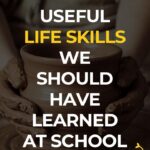Your daily life revolves around some life skills you should have learned at school!
It’s never too late to learn basic life skills you missed out on to help you link your past to your future.
Developing a child’s life for the future depends on learning basic life skills. Necessary skills equip the child to deal with everyday life’s challenges and events.
Do you regret missing out on some of the essential life skills you should have learned at school? Do you feel like it has affected your desired progression in life?
You are not alone. Each of us faces a tough life once in a while. The gap left by the lack of some life skills education in schools is partly to blame.
It’s never too late. You can recover bit by bit. Develop some life skills you missed out on to realize life changes.
It’s never too late. You can recover bit by bit. Develop some life skills you missed out on to realize life changes.
Join the conversation and find out how you can equip yourself with some essential life skills.
What is life skills education?
Life skills education is an education system that focuses on developing some essential skills to use in situations and challenges in the real world.
Do you ever look back in your school life and wonder about the benefits of some of the lessons you might have learned? For instance, did you learn about Napoleon Bonaparte? The question is, how is that lesson impacting your life now? Sometimes I wonder, what has Napoleon or any other historian got to do with my CURRENT life? 🙂
How I wish the energy and time spent in memorizing Napoleon Bonaparte’s exploits were directed in learning at least one useful life skills.
It took me several years after school to learn some life skills I should have acquired earlier. For instance, money management is a skill that I learned the hard way.
By the time I realized that I’m a spender, I was immersed in a stack-high pile of debts. Learning to cultivate a saving habit was a hard lesson.
The school taught me how to count money (mathematics), how to manage a business (business management), but not how to micro-manage every single cent that passes through my hands. No one told me it is the cents that make sense. Thanks to the ‘school of hard knocks,’ now I know!
Do I blame it on our teachers? No! I blame it on the education system. The system imparts knowledge, most of which is irrelevant in real life.
I yearn that the school education system globally could create time for developing life skills for students. There should be some room to integrate and accommodate life skills education into the current system.
What do you need help with?
(Choose between the 2 options)
Useful Life Skills We Should Have Learned at School
There are many life skills to deal with challenges you come across in your day-to-day life. I have just mentioned the necessary life skills that can help you unfold into others as you continue learning. I have laid them in segments for your easy follow.
Are you ready to equip yourself with strategies for developing life skills? Get set, and let’s go!
Interpersonal Life Skills
Society cohesiveness relies on interpersonal life skills, which every one of us should have learned at school. Strife, discord, conflict, contention, and divisions among members of a particular group could be lower compared to what we face in society today.
What are these interpersonal life skills that most of us missed out on in our education system?
1. Respect for One Another
Respect is the fundamental key in promoting relationships in any environment, be it working or socializing. Realize that respect is mutual. If you are an employer or a boss, respect your employees to earn back respect.
An employee should also respect the employer and the rest of the employees to create the right working environment.
2. Non-verbal or Body-Language Communication
Revisit the cliché ‘action speaks louder than words’ to get the right meaning and importance of body-language communication skills. Some of the non-verbal or body-language skills you might have to learn are:
- Body contacts such as a handshake in greetings, hugs, and others
- Eye contact
- Gestures
- Facial expressions
3. Empathizing and Understanding Others
In any relationship, empathy brings people closer. When you understand what your family member, spouse, a colleague is going through, you can empathize and hence offer help.
Empathy is the core value of a relationship. If you missed out on this skill, you must start developing it to build your relationships. It’s easy to create it. All you need is to place yourself in the other person’s situation. Imagine how the other person is feeling or going through, then you can know how to offer help.
Communication
Communication is a vital skill you should have learned in school. Lack of communication skills can fail all the other skills you might have learned before. Whether vocally or written, you must communicate skillfully to cover all aspects of your life.
One 2016 survey reports that employers cite communication skills, both written and verbal, as essential attributes a job candidate must attain.
4. Professional Communication
For professional communication, you must distinguish how to communicate differently with people in your professional field. It can either be your boss or your customer. Tailor your verbal or written communications effectively for your audience.
Listening carefully, attention to body language, and keeping eye contact are some of the communication skills you must acquire to reach your audience.
5. Personal Life Communication
Lack of proper communication can affect relationships by causing strife. Learn healthy habits of communication with your spouse, parent, child, siblings, and any other person closer to you. Your relationships can only thrive in your practical communication skills.
6. Business to Business Communication
Interactions with other business owners need excellent communication skills. It does not matter whether it is your business competitor. You should communicate amicably and professionally for both sides of business cohesion.
Maintain Self-confidence/Self-esteem
Self-confidence is never stable. At one time, you can feel high in confidence and other times, at your lowest. It’s, therefore, understandable when situations ‘puncture’ to ‘deflate’ your confidence.
In such a situation, you suddenly feel unworthy or unfit to achieve excellent results in anything you plan to do. But, that should not deter you from doing anything. Adapt positive habits to grow your confidence.
How do you do that?
7. Believe in Yourself
“Believe you can and you’re halfway there.” – (Eleanor Roosevelt). Believe in yourself to boost your self-esteem and capability in anything you endeavor to do. Always value yourself to become your own master.
8. Change Your Perspective
Direct your focus on your strengths more than your weaknesses. Reflect on your achievements whenever you feel your confidence and esteem ebbing away. Tell yourself, “If I did it, then, I could do it even better now.”
9. Be What You Want To Be
Be what you want to be and not what other people want you to be. Do everything your way, and you as long you know that’s the right way. I don’t mean you shut out any advice, but it’s what you feel about your decision that matters.
10. Embrace Your Failures
Treat your failures not as failures but as lessons you must learn. Dealing positively with your failure can make you wiser when you look at it from a positive perspective.
Learn To Be Resilient
Life is not always smooth. Sometimes your situation can get out of hand, and you feel like ‘throwing in the towel’ and giving up. Stay on, and stay put!
Life situations could knock you down. You could be dealing with a broken relationship, job loss, criticism, or whatever it is. Learn to bounce back and stand firm. Eventually, you can get through those tough moments.
How do you do that?
11. Face Life Situations
Learn to face and deal firmly with your situation or problem. Be positive and maintain your life balance without tilting to the negative side.
12. Seek Morale Support
When you can’t face your situation alone, seek moral support from your close family or your close friend. Sometimes you may need someone to lean on when you can’t do it alone. Seeking moral support does not mean you’ve failed to be resilient. It’s a way of strengthening you even more.
13. Nurture Yourself
Nurture yourself. You have no better friend than YOU. Take care of your mental and physical health and strength by living healthy.
Related article:
How To Build Your Resilience And Boost Your Self-Confidence
Managing Your Money
I don’t know whether it’s only me, but I experienced some challenges in this area. Join me to learn this critical life skill that can empower you on money matters.
14. Learn How to Budget Your Money
Managing your Budgeting lessons is essential if you would like to harness your spending thrifts habits. Learning budgeting skills can move you to the next level of saving money and being financial independence. Remember, it is essential to budget for emergencies.
15. Saving for Immediate Future
Continue learning how to be strict in your spending by preserving the surplus. After you have laid down your budget, save the rest. Start with a 10% savings rule for every money you receive.
16. Learn to Live a Debt-Free Life
Have control in your spending. Avoid finding yourself tied to many debts. Whatever debts you have right now, you can budget to offset them bit by bit.
17. Investing
The big plan in your savings is investing. Whatever little you save, look for better ways to invest. Not every idea is practicable to give you good returns. You may need to seek a professional advisor with viable investing plans.
18. Saving for Long-Term Future
Use your savings wisely to save for the long-term future, such as putting aside some money for retirement. You don’t have to work until you can’t work anymore. Keep aside some money to rest and enjoy in your retirement years.
Time Management
An essential life skill you might have missed learning at school is time management. The school system always managed the time for you. It organized and kept a scheduled timetable so that you never failed to keep time.
But, that school system was unable to control its time well. The school failed to create time to equip you with time management skills.
It’s time you learn time management skills to organize yourself. Managing your time can help you in accomplishing some of your key goals.
Estée Lauder once said – “I didn’t get there by wishing for it or hoping for it, but by working for it.”
Just like Estée Lauder, you can learn time management skills to organize yourself and accomplish your set plans and goals.
19. Setting goals
Setting your goals is the initial time management. Meeting your goals, whether long or short-term, can mark you as a professional time manager. Start by drawing a “Things-To-Do-Today” list. Ensure that at the end of the day, you have checked off every box.
20. Prioritizing Your Life Issues
Prioritize your life issues to deal with the most important ones and those that can’t wait any longer. Determine what is essential, what is urgent, what to list as an emergency, what to prioritize, and what can wait. Act on your issues according to those categories.
21. Planning Your Day
Planning is the backbone of time management. Lacking it can distort your time. Plan your day by setting each event with its time. Fix your time-breaks as well. Keep to the set plan to avoid a hectic day. Remember, failing to plan is planning to fail.
22. Organizing Yourself
Organizing yourself can save you stress in trying to fit new schedules amid others. Organize your calendar, desk, and files to have an easy time while running your duties. Arrange and organize everything you need for a particular event way ahead of it.
Negotiation Skills
Negotiating your way into a favorable deal is a skill you should have learned in school. In the current world, our negotiating skills pave the way to beneficial deals and getting what we want.
How do you do that?
23. Prepare To Negotiate
Effective negotiation requires prior preparation. Of importance also is to equip yourself with all knowledge regarding the subject matter. Information is power. Use it to place you at a vantage point when at a negotiation table.
It doesn’t matter whether you want to negotiate for your overtime or salary raise, learn how to negotiate effectively.
24. Prepare your BATNA
It is essential to prepare your BATNA (best alternative to a negotiated agreement) whenever you plan to negotiate. Have in place a plan B you can interject immediately your plan A fails to achieve the deal.
25. Recognize When to Accommodate
In every negotiation, there is either getting positive or negative results. In the example of negotiating for a higher salary, your employer may have better reasons to reject your request. In that case, you should accommodate his side of the deal, concede defeat, and “live to fight another day.”
26. Practice Negotiation Skills
Practice your new negotiation concepts with your friend or family members until you are sure you have acquired the right negotiation skills. Reflect on your new negotiation strategy and be vigilant with it. As you practice, you can perfect it and eventually present it.
Do-it-Yourself Skills
There are a few things you can learn doing for yourself instead of engaging an expert. Sometimes, we use a lot of money to pay for what we could have handled very well had we learned to do it.
Some of the do-it-yourself life skills you should have learned in school are:
27. Learn Simple Car Maintenance
Do you call your mechanic for simple motor tasks you could easily handle yourself? Do you want to know how to change car tire or how to change car oil? The two do-it-yourself life skills are essential to learning and many others.
Start learning by looking and asking questions whenever you get help to do it. You can even volunteer to do it.
28. Learn Painting
Learning how to paint can help you in saving the money you use in hiring someone to do it.
29. Learn Gardening
If you have a ‘green finger’ this is one life skill you may not want to miss. You can enjoy growing different items in your kitchen garden. You can also plant flowers of your choice in your flower garden.
Digital Platforms Usage Skills
Is there a gap in digital media behavioral skills in our society? Yes, a huge one!
You certainly agree that the behavior in digital media use is wanting! Some of the skills we should have learned in the use of digital gadgets are:
30. Digital Usage Skills in Child-Age
Rather than children learning digital skills on their own, it should be done legitimately to allow proper learning at an early age. It’s a digital world, and digital life skills education is not a choice but a necessity to everyone. Teach children common computer packages such as MS Word, Excel, and the rest.
31. Self-Control in Internet Use
Lifestyle changes are a concern to multiple researchers due to the ‘internet and social media addiction.’ Do you find yourself clicking the Instagram or Facebook icon first thing in the morning? Or, sometimes in the middle of a busy day, you get engrossed in one of your social media platforms?
Lack of internet-use behavioral skills is causing relationship-breakdowns and emotional instability. Such can cause introversion to several internet users.
Learn self-control on internet use by having a strict set-time for your social media interactions. Use the internet professionally and control it instead of allowing it to control you.
32. Internet Kindness
Schools’ education systems need to create internet behavioral life skills education. The education can lower if not putting an end to abusive and bullying cases on the internet.
Learn to be kind to one another on the internet and especially on social media. Create friendly internet stuff that can accommodate all age users, without affecting or impacting negatively.
33. Selfie Use
You must have heard of many fatal accidents happening all over the world from risky stunt poses when taking selfies. One case I single out is the tragedy of a student at Neahkahnie Mountain of the Oregon Coastline. The incident happened while the student was trying to get a better scenic view for a selfie.
If the education system had selfie-use life skills, danger-awareness could prevent such fatal cases.
Summing Up!!
Life skills are important for students, especially the ones we have mentioned in this post.
After you have known how to develop life skills, you can hardly struggle with your personal and social status.
“Finding an opportunity is a matter of believing it’s there.” Barbara Ann Corcoran
When I came across Barbara Corcoran’s wise quote, I vowed to start believing in myself. I took a step to learn through ‘thick and thin’ how to budget, straining my spending thrifts, and enforcing my savings. That is how I developed my most challenging life skills.
Now, I am proud to say that I’m my ‘personal money manager.’
What life skills did you instill to develop after school? How have such life skills impacted your life?
Please share your life experiences, your challenges, and that one life skill that has made a difference in your life! 🙂




